| Srl | Item |
| 1 |
ID:
112417


|
|
|
|
|
| Publication |
2012.
|
| Summary/Abstract |
India's role in Sri Lanka assumes more significance now than before, with the end of war and devolution of power sharing in limbo. While the LTTE is wiped out militarily and isolated internationally, the existing militarisation in Jaffna with war crime charges at UN and awaiting political solution in limbo, Sri Lanka demands India's attention. The call for India's greater engagement with Sri Lanka had resurfaced domestically with a demand from Tamil Nadu parties urging India to play a more proactive role pertaining to rebuilding and sustaining peace in post-war Sri Lanka, and in ending assault on Indian fisherman at Palk Strait. On other hand, the fostering of ties between Sri Lanka and Pakistan and China push for more primed hands-on role from the point of view of India's long-term strategic interest. There is, therefore, a need to have a re-look of India's policy options towards Sri Lanka in light of recent developments.
|
|
|
|
|
|
|
|
|
|
|
|
|
|
|
|
| 2 |
ID:
079548
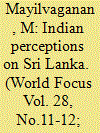

|
|
|
| 3 |
ID:
084890
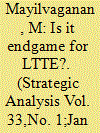

|
|
|
|
|
| Publication |
2009.
|
| Summary/Abstract |
Abstract The LTTE (Liberation Tigers of Tamil Eelam) struggle against the Sri Lankan Government has taken different forms at different times since early 1970s. However, developments since 2006 have had an adverse impact on the LTTE and its efforts to seek a solution through violent means. The LTTE's numerical strength has fallen and it is also not doing too well in drafting recruits and procuring arms. The territory under its control is shrinking visibly: from the loss of the East and now with the intrusion of the Sri Lankan troops deep inside Killinochchi. The global war on terrorism (GWOT) and the ascendancy of the Sri Lankan Security Forces (SLSF) have contributed for the present quagmire. Despite the support from Tamils in Sri Lanka and diaspora, the LTTE's depleting profile raises certain fundamental questions about the efficacy and its existence. While the LTTE is weakened, it is doubtful that it will be completely dislodged from the Sri Lankan scene. There is even less reason to believe that the LTTE would concur with the government conceding its armed struggle for Eelam to save its strength. The argument in this article is mainly about the importance of taking into account the LTTE's profile in the post-2006 scenario.
|
|
|
|
|
|
|
|
|
|
|
|
|
|
|
|
| 4 |
ID:
083590
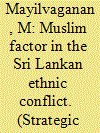

|
|
|
|
|
| Publication |
2008.
|
| Summary/Abstract |
The Muslims in Sri Lanka have emerged as a key stakeholder in the past decade. Though they have not directly participated in the conflict, their intervention in the recent peace moves and their role in the May 10, 2008 Eastern Provincial Council election, the first in two decades, has underscored the significance of the Muslim factor in Sri Lankan politics. In fact, the increasing profile of Sri Lankan Muslims has raised certain fundamental questions about the efficacy and durability of any final settlement of the ethnic conflict that may be arrived at. This paper emphasizes the importance of taking into account the Muslim factor in any envisaged Sri Lankan peace settlement
|
|
|
|
|
|
|
|
|
|
|
|
|
|
|
|
| 5 |
ID:
079863
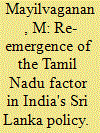

|
|
|
|
|
| Publication |
2007.
|
| Summary/Abstract |
The Tamil minority in Sri Lanka have traditionally exerted a sympathetic pull on their co-ethnics in Tamil Nadu. This has inevitably influenced India's policy towards Sri Lanka. The assassination of Rajiv Gandhi in 1991 changed this pattern and the popular sympathy for Tamil militancy ebbed considerably in its aftermath. However, the spontaneous reactions by the political parties of Tamil Nadu to the Sri Lankan government's indiscriminate air attack on Tamil majority areas since mid-2006 and the flight of refugees to India indicate that Tamil Nadu may have resurfaced as an important factor in India's Sri Lanka policy. For New Delhi, it can neither afford to see the Liberation Tigers of Tamil Eelam (LTTE) strengthen its foothold by taking advantage of influx of refugees, nor can it be a silent spectator to the humanitarian crisis in Sri Lanka as the Government of Sri Lanka appears determined to find a military solution to the ethnic problem. There is, therefore, a need to analyse the re-emergence of the Tamil Nadu factor in the post-Rajiv Gandhi assassination phase
|
|
|
|
|
|
|
|
|
|
|
|
|
|
|
|
| 6 |
ID:
080612
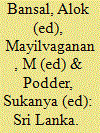

|
|
|
|
|
| Publication |
New Delhi, Manas Publications, 2007.
|
| Description |
247p.
|
| Standard Number |
8170493404
|
|
|
|
|
|
|
|
|
|
|
|
Copies: C:1/I:0,R:0,Q:0
Circulation
| Accession# | Call# | Current Location | Status | Policy | Location |
| 052945 | 303.69095493/BAN 052945 | Main | On Shelf | General | |
|
|
|
|
| 7 |
ID:
077994
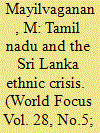

|
|
|